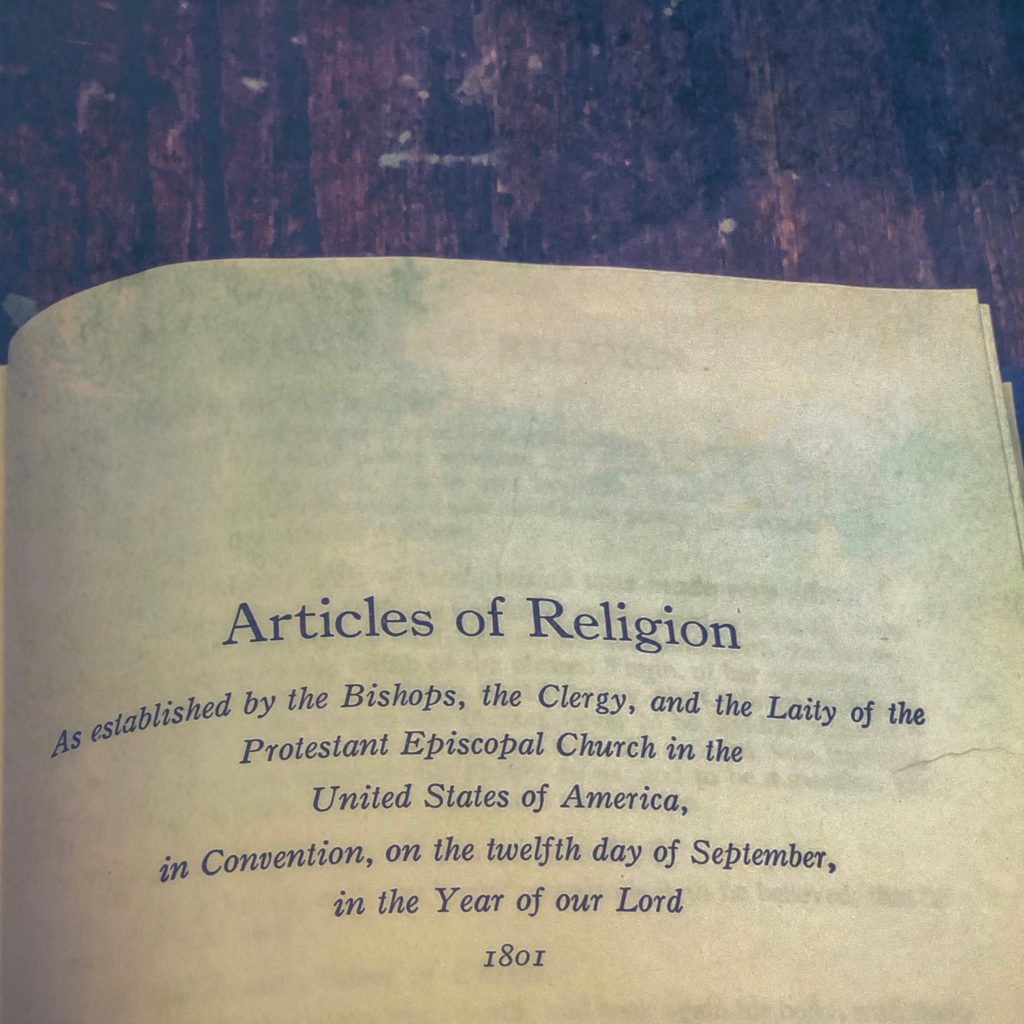
They also are to be had accursed that presume to say, That every man shall be saved by the Law or Sect which he professeth, so that he be diligent to frame his life according to that Law, and the light of Nature. For Holy Scripture doth set out unto us only the Name of Jesus Christ, whereby men must be saved.
by the Rev. Joshua Rodriguez-Hobbs
Article XVIII is, in many ways, the conclusion of a series of articles, beginning in Article IX, which represent an Anglican understanding of the Reformed doctrine of justification. These ten articles demonstrate the influence of the continental Reformation on the English Church and reveal a decidedly Protestant tendency among the Elizabethan Divines.
This article is a companion to Article XI and Article XII, which also deal with the question of whether our works, our outward religious observances, can save us. Article XI teaches that salvation comes by faith alone, and not by works, while Article XII teaches that good works are the result of faith. This is a classically Anglican pairing, going all the way back to Thomas Cranmer, the first Protestant Archbishop of Canterbury, in his “A Sermon of the Salvation of Mankind, by Only Christ Our Savior, from Sin and Death Everlasting,” in the First Book of Homilies. Article XVIII’s insistence that we are saved only through the “Name of Jesus Christ” must be read in this light. The outward observance of the Law—or following the traditions of our Church or Sect—does not save us. However, the observance of the Law is the fruit of the Gospel, and is a sign that we are working out our own salvation, as St. Paul exhorts (Phil 2:12). That is, we become partners with God, not in our salvation, but in our sanctification, a hallmark of Anglican pastoral theology.
This article also points us to the Acts of the Apostles, where St. Peter, when he and St. John are called before the Sanhedrin, confesses, “There is salvation in no one else, for there is no other name under heaven given among mortals by which we must be saved.” (Acts 4:14, NRSV) This insistence upon salvation through Christ should be read as a rebuke to other Reformation groups which took their name from their founder (sometimes, as in the case of the Lutheran Reformation, against the founder’s wishes). Anglicanism has always sought to be simply Christian, something which was keenly on the mind of the Elizabethan Divines when they drafted the Thirty-Nine Articles. After all, Elizabeth I’s goal was to create a church which could comprehend all of her subjects.
Why is this important? What does this article, drafted in the midst of centuries-old religious polemics, have to say to us today?
Article XVIII drives home the doctrine of justification by faith. It tells me that I am utterly unable to save myself. I am utterly dependent on the mercy and grace of God expressed in the life, death, and resurrection of Jesus Christ, the Incarnate Son. The previous nine articles have variously expressed this. However, Article XVIII makes this abundantly clear by describing my efforts to save myself as “accursed.” This is strong language, and my immediate reaction to it is frustration. It is a message that I do not want to hear.
Yet, it is the message that I most need to hear. This is the heart of the Gospel. As St. Paul says in his letter to the Galations: “For through the law I died to the law, so that I might live to God. I have been crucified with Christ; and it is no longer I who live, but it is Christ who lives in me. And the life I now live in the flesh I live by faith in the Son of God, who loved me and gave himself for me. I do not nullify the grace of God; for if justification comes through the law, then Christ died for nothing.” (2:19-21) I have been crucified with Christ. Christ lives in me, and not me in myself any longer. Paul, in all of his letters, assures us that Christ did not die in vain, and so it must follow that I cannot be saved through my outward observance of the Law.
And the Law comes in many forms, secular as well as religious. It comes in the form of religious scrupulosity, rejoicing in how well I uphold the rubrics of the Book of Common Prayer. As a new father, it comes so often in my attempts to justify myself to everyone around me, my son’s pediatrician included, of my parenting skills. It comes in my seeking self-worth through my resume, in my appeals to my degrees and training, in my attempts to be a “good” son and husband. None of these things can save me. All of my efforts to justify myself through them are, ultimately, accursed.
Cranmer, in his homily on salvation, preached, “Neither doth faith shut out the justice of our good works, necessarily to be done afterwards, of duty towards God . . . but it excludeth them, so that we may not do them to this intent, to be made just by doing them.”[1] Cranmer was intent to defend himself from charges of antinomianism, and he wanted to show the place of good works in the Christian life. His classically Anglican answer was to position good works as our response to God, our duty, as Cranmer called it. Yet, Cranmer’s words in the Prayer Book also teach us that our dutiful response to God is also joyful.
My attempts to justify myself are seldom joyful. The purpose of the Law is to convict us of sin and to point us toward Christ. Upholding the Law for its own sake can never bring me joy, because the Law can only convict me. In itself, it offers no solution to the demands it places on me and which I place on myself. It is only through the Name of Jesus Christ that I can find this solution. When my efforts to be a good father, son, husband, and employee are my joyful response to God, seeking his glory rather than my own, then I can find peace. As the Prayer Book says, borrowing from Augustine of Hippo, serving God is “perfect freedom.”[2]
This freedom is only found in the practice of humility. St. Paul, in the middle of his great discourse on the resurrection, reminds the Corinthians, “I die daily.” (1 Cor 15:31, KJV) Here is where Cranmer’s homily and Article XVIII point us. It is ultimately only through death to self that we find life. I have been crucified with Christ. It is only through his name that I find the justification that I so desperately seek. John Jewel, the Bishop of Salisbury, wrote, “We, verily, because we know this [i.e. Christ’s death] to be the only sacrifice, are well content with it alone and look for none other.”[3] This constant practice of humility, dying daily to myself, teaches me to be content with Christ alone. Nothing else can satisfy.
Here also is where Cranmer concludes the second part of his homily on salvation: “It is not I that take away your sins, but it is Christ only; and to him only I send you for that purpose, forsaking therein all your good virtues, words, thoughts, and works, and only putting your trust in Christ.”[4]
Only putting my trust in Christ can be so very hard. It seems so counterintuitive. There must be more that I need to do. And yet, in both my on spiritual life and my ministry as a hospital chaplain, I am constantly brought back to the realization that it actually is this simple. All we need to do is to turn to Christ.
I constantly encounter patients who are carrying heavy burdens, burdens which were often placed on their backs by their faith communities. They are convinced that their illness is their fault or a divine punishment. They feel their own sins, their own failures, have brought this crisis upon themselves. They are suffering, not just physically, but mentally and spirituality by their own inability to uphold the Law. The cruel irony is that none of us can uphold the Law, whatever its source. So many faith communities, Episcopal and otherwise, seem hellbent on convincing people otherwise, however. My ministry as a chaplain is to bear witness to the pain that each of us feels in this failure, and to point to where God is already active in their lives. This is a living out of salvation coming through the name of Jesus Christ alone. I, like John the Baptist, simply point patients to their own belief in Jesus and trust him to bring peace and healing. I am simply a witness.
Somehow, this is the only thing that brings contentment to any of us.
The
Rev. Joshua Rodriguez-Hobbs serves as the Episcopal Chaplain to the Johns
Hopkins Hospital, a joint ministry of the Episcopal Diocese of Maryland the
Johns Hopkins Medical Institutions. Josh is a 2018 Episcopal Church Foundation
Fellow and a Certified Educator Candidate with the Association for Clinical
Pastoral Education.
[1] Thomas Cranmer, “A Sermon of the Salvation of Mankind,” pages 19-30 in The Book of Homilies (Nashotah: Nashotah House, 2013).
[2] The Book of Common Prayer, 1979, 57.
[3] John Jewel, An Apology of the Church of England (New York: Church Publishing, 2002), 39, emphasis added.
[4]Cranmer, 25.
